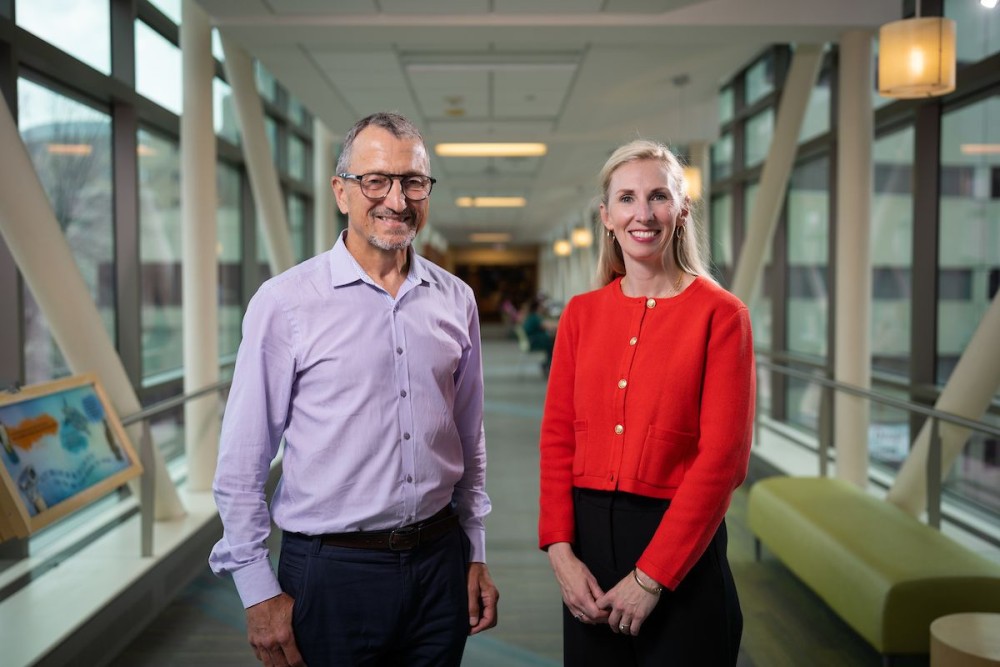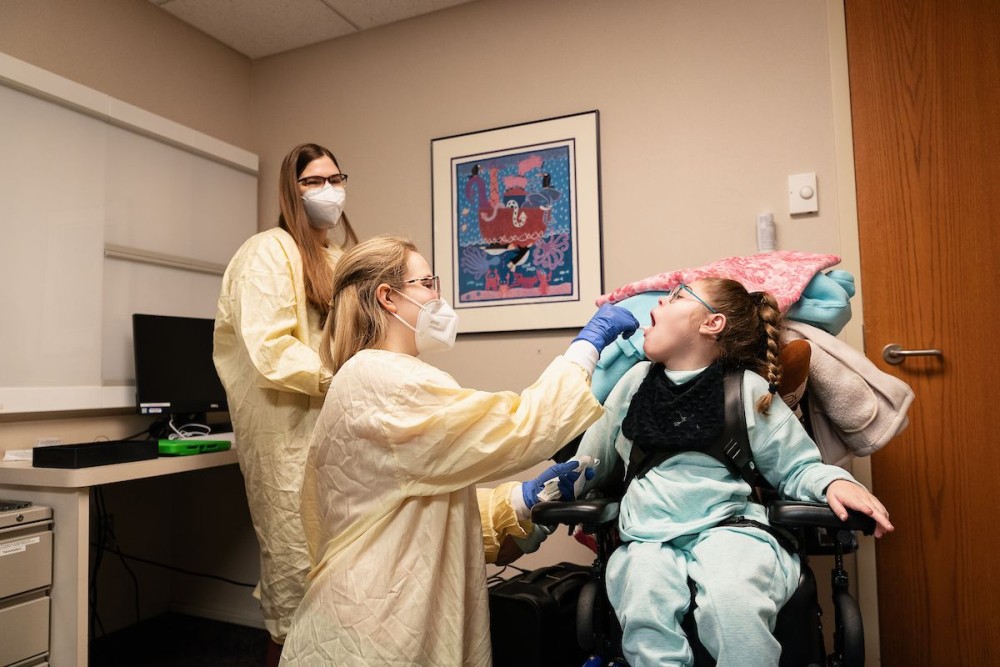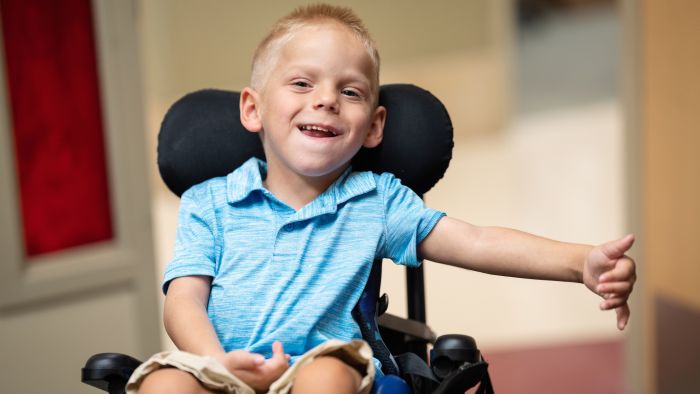The Gillette Children’s Cerebral Palsy (CP) Institute is transforming what is possible for children diagnosed with cerebral palsy by developing novel research, advocacy, and harnessing the power of our multi-disciplinary care team experts. As the only institute devoted to cerebral palsy patients and care, Gillette is focused on ensuring children live a life determined by their dreams and not their diagnosis.
The Cerebral Palsy Institute is guided by Gillette's nationally and internationally known leaders in the field of cerebral palsy, such as, orthopedic surgeon, Tom Novacheck, MD, and Gillette's director of clinical transformation, Andrea Bushaw, PhD.
“For decades, Gillette has been a leader in CP care, research, and advocacy,” Novacheck says. “However, with new findings and new treatments, Gillette is now taking a louder stance to make a difference in the care of people with CP in our community and around the world.”
CP research, experts and advocacy
“The Cerebral Palsy Institute is an amazing initiative where Gillette has come together and set a goal: We want all these clinicians to do as much as possible for our children with cerebral palsy with all the tools that they need to care for them. We want to do it in the most coordinated fashion as quickly as possible,” says Marcie Ward MD, a nationally recognized pediatric rehabilitation medicine physician. “With this focus, we’ll be able to serve the patients’ needs most fully.”
Beyond its recognized excellence in pediatric diagnostic, medical, surgical, and rehabilitative care, three pillars set Gillette apart when it comes to its Cerebral Palsy Institute. These pillars are research, an expert care team, and advocacy.

Gillette orthopedic surgeon, Tom Novacheck, MD, and Gillette director of clinical transformation, Andrea Bushaw, PhD, work together to lead the Cerebral Palsy Institute.
Learn more about Gillette Children's Cerebral Palsy Institute.
Research transforms care
At Gillette, each research study is designed with patients in mind from the start and, when appropirate, even includes patients and families in designing studies.
Gillette research spans both short-term and long-term outcomes, evaluating the treatment patients are having currently, but also training an eye on the future when patients grow into adulthood. Over the past five years, researchers have completed four long-term outcome studies to study the effects of the more common CP interventions.
By investigating the topics that affect CP patients most, like increased risk of falls or pain in nonverbal patients, researchers learn when best practices should change, and treatment recommendations should be updated. When this inevitably happens, Gillette providers have the data needed to explain to patients why their care journey looks the way it does.
“Our job when we're seeing a child with their family is to provide counsel, and that counseling means thinking about where we are today and discussing what are the immediate and long-term pros and cons of doing or not doing a particular intervention,” Novacheck says. “We do the interventions when indicated, of course, but before getting to that point we must provide that guidance for families to be able to make the decision.”
Novacheck explains, “Because of our patient-centered research, in clinic visits, we can pull out a patient’s data and share that data with them as we discuss their options. You'd like for your own health care to be data-driven, right? With medical technology, that's becoming increasingly possible, and that's one of the things that we've innovated at Gillette and in the Cerebral Palsy Institute.”
Research efforts would be in vain without the strong, adaptable care teams at Gillette who adjust their practice with each new finding.

Gillette Children's researchers are conducting a sensory and pain research study to help patients diagnosed with cerebral palsy.
A community of family-centered care
Gillette boasts internationally recognized experts from many specialties who work as a single team to provide comprehensive, coordinated, and highly personalized care.
CP is a complex condition that can affect many parts of the body, as a result, a child will likely see specialists in neurology, neurosurgery, orthopedics, rehabilitation medicine, sleep medicine, rehabilitation therapies and orthotics, prosthetics and seating.
“So much of the world of cerebral palsy care has been isolated and siloed, which puts the patient and the family in the middle trying to interpret what is going on,” Novacheck says. “It gets very difficult when sometimes those recommendations are in opposite directions. One of the things that made Gillette unique from the very beginning of my career more than 30 years ago is that we were already doing some multispecialty, multidisciplinary clinics.”
Gillette Children's's Cerebral Palsy Institute is united by the fact that a child's story is just beginning. We surround the child and family with a community of experts to enable a child's dreams and goals.
Advocacy builds a better world
At Gillette, our wish is that all children live fully without barriers and this is the core of our advocacy work on behalf of patients. From working with leaders to build adaptive playgrounds, and championing community support, our the Gillette advocacy team works to ensure the rights of all children are respected.
“The work at Gillette Children's is really to help the whole child enter life and do as much as possible,” says Marcie Ward, MD. “In the clinic or in the hospital for a procedure, we will do that medical work but that’s not our only goal. We focus on: we've improved their walking, we've helped their ability to get about, now where do they want to go with that?”
Ward adds, “Whether it's riding a bicycle or a downhill skiing or waterskiing, fishing, archery, bow hunting…our goal is really to help those kids be able to do any pursuit that they're interested in - even if they need assistance to do it, even if they need adaptive equipment to do it.”
As the medical teams work to help each patient reach their potential, the advocacy team is working to ensure their rights and needs are respected. From policy to building adaptive playgrounds, championing community support is a big part of Gillette Children’s culture.
“We want the rest of the community – and the rest of the world - to embrace children and adults who have cerebral palsy and other lifelong conditions,” Ward says, “We want them to be accepted in the community just the way the rest of us are with all their gifts and all their abilities.”
 Home Page
Home Page

